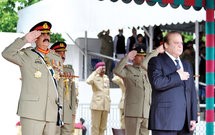 Pakistan is undergoing a major reshuffling of its top brass, with five senior generals due to retire in October. On Thursday, BBC Urdu reported that Islamabad would name a new director-general of its premier spy service, the Inter-Services Intelligence directorate, in a few days.
Pakistan is undergoing a major reshuffling of its top brass, with five senior generals due to retire in October. On Thursday, BBC Urdu reported that Islamabad would name a new director-general of its premier spy service, the Inter-Services Intelligence directorate, in a few days.
The shifts come at a time of great domestic turmoil and amid significant flux in the country's geopolitical environment. The changes will affect the civil-military balance of power and will prevent the already weakened Prime Minister Nawaz Sharif from making much headway in his efforts to enhance civilian supremacy over the military.
In the geopolitical long run, of course, specific personalities do not matter much. Institutions and impersonal forces constrain the actions of leaders, shaping outcomes. In the short term, however, and especially in countries marred by political instability, personalities can leave a large mark on a country.
Moreover, nascent democratic leaderships in countries long dominated by their militaries view the chance to name and promote generals as a golden opportunity to try to make important progress toward subordinating the armed forces to the elected government. This occurred in recent years in Turkey, where then-Prime Minister (he is now president) Recep Tayyip Erdogan's government gradually reined in the country's once untouchable general staff. Though many factors strengthened Ankara's hand — such as an improving economy and the maturation of civilian institutions — the real change was cemented when the old guard instrumental in maintaining the military's upper hand was eased out in favor of a newer generation of generals.
Sharif is known for seeing Turkey's ruling Justice and Development Party as his model, but he and his associates are also well aware of the major differences in the countries' respective domestic circumstances. Unlike the Turkish government, which heads the Supreme Military Council, Pakistan's civilian government can appoint only the joint chief, the three services chiefs and the Inter-Services Intelligence chief — and that, too, with heavy input from the army command.
Having appointed a new joint chief and army chief last year, Sharif now needs an Inter-Services Intelligence chief who can help him further curb the agency's role in domestic politics and through whom his government can increase its role in foreign policy and national security matters, especially with regard to the war against Taliban rebels in North Waziristan, a post-NATO Afghanistan and a Narendra Modi-led India. Sharif's hand, however, has been severely weakened because of his government's inability to manage the crisis stemming from the unrest created by the populist movements led by Imran Khan and Tahir-ul-Qadri. This crisis enabled the army to regain the role of systemic referee, explaining why Sharif's ability to select new top brass is likely to be limited.
A return to the old days of military rule in Pakistan is unlikely, but democratic consolidation is equally unlikely.But over the course of the next year, another nine top commanders are due to retire. The thing to watch is how the new military leadership and the government will be able to manage each other.
Courtesy : Stratfor (www.stratfor.com)